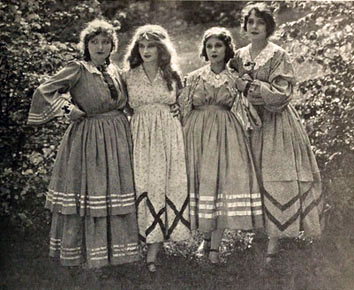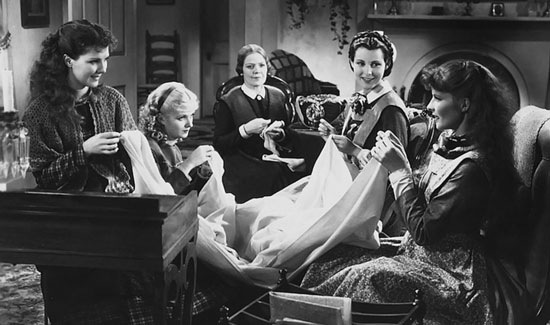Little Women Movie & TV Adaptations
Little Women Movie & TV Adaptations
The classic book Little Women is Louisa May Alcott’s semi-autobiographical account of her life with her three sisters in Concord, Massachusetts in the 1860s.
The story tells of how the sisters grow up and find their place in the world.
Set against the backdrop of the Civil War, the story follows sisters Jo, Meg, Beth and Amy March on their journey from childhood to adulthood. With the help of their mother, Marmee, and while their father is away at war, the girls navigate what it means to be a young woman: from sibling rivalry and first love, to loss and marriage.
Though Alcott was initially hesitant to write a story for girls, she was urged to do so by editor Thomas Niles. When she read the proof, she responded that “it reads better than I expected. Not a bit sensational, but simple and true, for we really lived most of it, and if it succeeds that will be the reason of it. Mr. N likes it better now, and says some girls who have read the manuscripts say it is ‘splendid!’ As it is for them, they are the best critics, so I should be satisfied.”
Editions vary in text and illustration, but the interpretation of that text (empowerment, sisterliness, identity, romance, gender roles, desire) ultimately falls to the reader, and in the case of re-contextualizing the story, to the adaptor. The classic has been made into countless plays, at least fifteen musicals, an opera, anime and a ballet, and from the beginning of the film era it was clear that with all its vivid period detail, Little Women was perfectly suited for the screen.
There have been multiple movies and films based on the book, and some new adaptations – including one from PBS Masterpiece and BBC – are in the works. (The cast and more details about the upcoming period series is toward the end of the post.)
Let’s have a quick Little Women-in-film primer to look at what has come before, and what we can look forward to.
 Little Women (1919)
Little Women (1919)
In the late 1910s, there were two silent adaptations ofLittle Women: one British, the other American. The 1917 version, though lost, is assumed to have been a short film.
The other, a one-hour movie starring Dorothy Bernard as Jo, and Isabel Lamon as sister Meg, was shot on location in Concord in 1918 at the author’s home and had a general release the following year. The home of Ralph Waldo Emerson was also shown in the film. The William A. Brady Picture, (Brady had produced a 1912 stage version of the novel), was praised for its “gentle atmosphere” by Frederick James in the Motion Picture Classic(February 1919). He added “Dorothy Bernard is delightful as Jo, and Conrad Nagel is a very likable Laurie.” This version, which was directed by Harley Knoles and distributed by Paramount, is presumed lost.
 Little Women (1933), Courtesy RKO Pictures
Little Women (1933), Courtesy RKO Pictures
The March house was modeled on Louisa May Alcott’s own home in Massachusetts, and the script closely followed the novel. Its success allowed for headway for other literary adaptations to follow suit.
Additionally, there was also a one-hour musical 1958 adaptation for CBS.
Shy Ginny Clark steals the show when she takes a lesson from her character, Jo, and surprises everyone by playing her part to perfection, both on and off the stage.
Perhaps a bit too sweet an adaptation for some with a plot that takes a few liberties, it is nonetheless wholesome and has some strong emotional moments.
In 1958, the BBC broadcast – and recorded – a new 6-part, also thorough, adaptation starring Andrée Melly as Jo, Kate Cameron as Meg, Diana Day as Beth, Sylvia Davies as Amy, Phyllis Calvert (The House of Eliott, Mrs Dalloway) as the mother, and David Cole as Laurie.
The 9-episode mini-series shown on the Sunday tea-time slot on BBC1 was filmed in studio and faithfully covered just about everything in the book, albeit in a low-budget British context kind of way. The series received criticism for the actresses playing the sisters being too old, for the bad wigs they wore, and for the accents being a strange amalgam of British and Southern drawl. A highlight was Stephen Turner, who was praised for his portrayal of Laurie.
Also starring in the 1994 film were Susan Sarandon as Marmee, Gabriel Byrne as the Professor, Claire Danes as Beth, Kirsten Dunst as the young Amy, Christian Bale as Laurie, John Neville as Mr. Laurence, Eric Stoltz as John Brooke and Mary Wickes as Aunt March.
The plot line echoes that of the book, and the costumes by Colleen Atwood are historically accurate, but it’s depth can be attributed to it’s reverence to Alcott’s intentions, the cast, and to Gillian Armstrong, who directed the powerful period drama My Brilliant Career prior to Little Women. After, she brought us another Willow and Thatch favorite Oscar and Lucinda, and Charlotte Gray. Armstrong was the first female to direct an adaptation of Little Women. In his review of the 1994 period drama, Roger Ebert wrote that “The film is true to Alcott’s story about how all of life seems to stretch ahead of us when we’re young, and how, through a series of choices, we choose and narrow our destiny. The buried issues in the story are quite modern: How must a woman negotiate the right path between society’s notions of marriage and household, and her own dreams of doing something really special, all on her own?”
As in the 1933 version, the home in the movie was based on Orchard House, where Louisa May Alcott’s wrote and set Little Women.
Mark Adamo’s opera Little Women has been performed in more than 70 national and international engagements since its première by Houston Grand Opera and has achieved the status of an American classic.
2018 will be the 150th anniversary of the Little Women, and the film’s producers plan to begin filming in Utah in June 2017, with an eye on a release timed to coincide with the milestone.
Here’s what we know:
Who: Heidi Thomas (Madame Bovary, I Capture the Castle, Lilies, Ballet Shoes, Cranford, Upstairs Downstairs, Call the Midwife) will write the mini-series.
Little Women is one of the most loved novels in the English language, and with good reason. Its humanity, humour and tenderness never date, and as a study of love, grief and growing up it has no equal. There could be no better time to revisit the story of a family striving for happiness in an uncertain world, and I am thrilled to be bringing the March girls to a new generation of viewers. – Heidi Thomas
Vanessa Caswill will direct, and Playground (Wolf Hall, The White Princes) will produce the project for BBC and Masterpiece. Playground has produced over 50 hours of prime time television drama garnering 15 Emmy nominations, 20 BAFTA nominations, and 12 Golden Globe nominations, including a Golden Globe win for Best Miniseries. They are currently in production on Academy Award winner Kenneth Lonergan’s adaptation of E.M. Forster’s classic novel Howards End starring Hayley Atwell, Matthew Macfadyen and Tracey Ullman, and directed by Hettie Macdonald for the BBC and Starz.
Bringing alive this beloved American novel for a new generation of PBS viewers is a dream come true. In the hands of Rebecca Eaton and Colin Callender’s Playground, and with the superb talents of writer Heidi Thomas, we are confident this story of strong women will resonate with both new and longtime fans of MASTERPIECE. – Beth Hoppe, Chief Programming Executive and General Manager, General Audience Programming, PBS
The cast: BAFTA Award-winner Emily Watson (Genius, The Book Thief, Anna Karenina, War Horse, Angela’s Ashes) is set to play Marmee, the iconic matriarch of the March family.
The March sisters will be played by an ensemble of four exciting young actresses – newcomer Maya Hawke takes the role of willful and adventurous Jo, Willa Fitzgerald will play the eldest daughter Meg, Annes Elwy (King Arthur: Excalibur Rising) will play Beth, and Kathryn Newton takes the role of the youngest sister Amy. Here’s a first look at the sisters:
Academy Award-winner Dame Angela Lansbury (Mary Poppins Returns, Driving Miss Daisy, Murder, She Wrote, The Manchurian Candidate) will play the girls’ wealthy relative – the cantankerous Aunt March.
BAFTA Award-winner Michael Gambon (Victoria and Abdul, Harry Potter, Churchill’s Secret, The King’s Speech, Emma, Cranford, Wives and Daughters) takes the role of their benevolent neighbor Mr. Laurence, and Jonah Hauer-King (Howards End mini-series) will play his grandson Laurie Laurence, the charming boy next door. Dylan Baker will play Mr. March, Julian Morris is John Brooke, and Mark Stanley (Dickensian, Mr. Turner, The Collection) is our Professor Bhaer.
What: A three-hour television mini-series based on coming-of-age American Classic to air on PBS Masterpiece.
The mini-series is a storytelling form unique to television, and the opportunity to adapt Louisa May Alcott’s novel over three hours is a gift from the BBC and MASTERPIECE on PBS. This is a character study of young women rich in texture and detail, and it’s an honour to be able to bring it to life in this extended form with the great Heidi Thomas, one of the finest writers working in television today. In the hands of the exciting directorial style of filmmaker Vanessa Caswill we hope to deliver a new screen version that will speak to contemporary audiences, meet the expectations of the book’s ardent fans and bring a whole new generation to this great classic. – Executive producer Callender
When: With a production team from the UK and US, principal photography will begin in July in Ireland.
There are only a handful of American books that have resonated with readers for as long as Little Women. To put this deeply moving story in the hands of a writer with the heart and depth of Heidi Thomas seems just right. – Rebecca Eaton, MASTERPIECE executive producer
If you’d like to read the classic again and learn more about Louisa May Alcott and how it has been adapted, you may want a copy of The Annotated Little Women: Since its publication in 1868–69, Little Women, perhaps America’s most beloved children’s classic, has been handed down from mother to daughter for generations. This lavish, four-color edition features over 220 curated illustrations, including stills from the films, stunning art by Norman Rockwell, and iconic illustrations by children’s-book illustrators Alice Barber Stevens, Frank T. Merrill, and Jessie Wilcox Smith.
Renowned Alcott scholar John Matteson brings his expertise to the book, to the March family it creates, and to the Alcott family who inspired it all. Through numerous photographs taken in the Alcott family home expressly for this edition―elder daughter Anna’s wedding dress, the Alcott sisters’ theater costumes, sister May’s art, and Abba Alcott’s recipe book―readers discover the extraordinary links between the real and the fictional family.
Matteson’s annotations evoke the once-used objects and culture of a distant but still-relevant time, from the horse-drawn carriages to the art Alcott carefully placed in her story to references to persons little known today. His brilliant introductory essays examine Little Women’s pivotal place in children’s literature and tell the story of Alcott herself―a tale every bit as captivating as her fiction.








Comments
Post a Comment